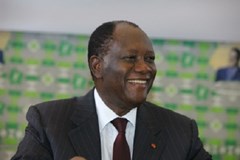Ivory Coast has seen dramatic growth and development since the country’s bitter civil war after its 2010 presidential elections.
Ivorian president Alassane Ouattara.
“The growth, by any metrics, has been remarkable. With Cote D’Ivoire, on the one hand, the economic and business environment has accelerated at a rapid pace. Growth is around nine per cent, inflation is lower, fiscal management has improved, foreign investment is flowing in,” Rand Merchant Bank country risk analyst Ronak Gopaldas told CNBC Africa.
“On the other side, on the political insecurity front, the pace of that progress has not kept up to speed with the economic growth. The process of reconciliation has been slow, the disarmament of the ex-combatants and militants in the country has been slow. Overall, it’s a mixed picture. You’ve got rapid and buoyant growth, and that trend will continue, but there needs to be more progress on the political side of things.”
Ivory Coast however posted growth of more than 8.5 per cent last year. This is a significant turnaround as the country previously had a declining growth rate of more than four per cent during the civil war.
The International Criminal Court (ICC) is currently gathering evidence to bring former Ivorian president Laurent Gbagbo to trial for his role in the country’s 2010 civil war. Violence and clashes occurred after Gbagbo refused to accept current president Alassane Ouattara’s win over the presidential vote.
“It’s been an on-going process and we don’t expect any resolution to the trial anytime soon. If you look at the example of Charles Taylor in Liberia, that trial took nine years to conclude,” Gopaldas explained.
“The issue with Gbagbo’s trial and the ICC is that it was recently postponed, citing a lack of hard evidence. The prosecutor for the ICC has until November to augment the case and make it more robust.”
The country still however continues to grow and is becoming a key local, regional and international investor destination.
The country’s 4.4 billion dollar debt was also cancelled after it completed a successful economic programme. Government have forecasted economic growth at nine per cent this year, and at 10 per cent in the next.
“The current president Alassane Ouattara, as a former economist at the IMF, has pursued a very ambitious reform agenda. If you look at the drivers of the economy, Cote D’Ivoire is the world’s largest cocoa producer, there’s strong potential in the energy sector,” said Gopaldas.
“One of the key aspects that president Ouattara has been focusing on is stimulating public investment through the likes of infrastructure project to crowd in private investment, and that’s largely been successful and that’s playing out in the very robust growth rates that you’re seeing.”



Comment here
You must be logged in to post a comment.